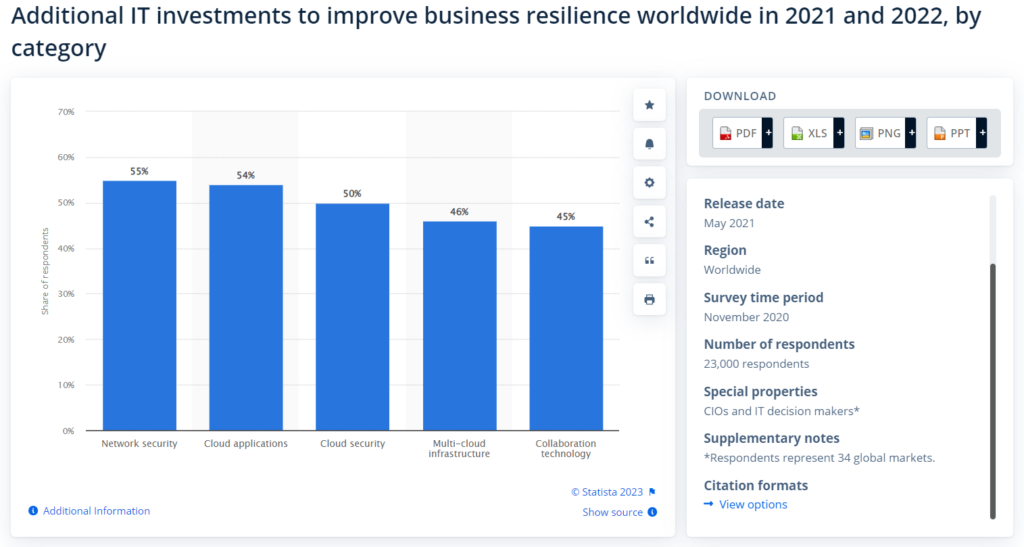
The ability to withstand disruptions, adapt to change, and bounce back from challenges is what defines business resilience. At Labyrinth Technology, we understand the importance of this concept and its significance for modern enterprises.
So, what exactly is business resilience, and why is it crucial for modern enterprises? Let’s explore this concept together.
Business resilience is the ability of an organisation to adapt, respond, and recover from disruptions, challenges, and crises while maintaining its essential functions, reputation, and profitability. It is a proactive approach to managing risk and ensuring that a company can continue to operate effectively even in the face of adverse events. Business resilience goes beyond traditional risk management and crisis response by focusing on the organisation’s ability to withstand, adapt to, and bounce back from various unexpected or adverse situations.
For example, consider a global supply chain that weaves together suppliers from multiple countries to provide components for a smartphone manufacturer. A supply chain disruption due to a natural disaster or geopolitical tension can significantly impact production. Business resilience would entail having alternative suppliers, diversifying the sourcing strategy, or creating inventory buffers to ensure that smartphone manufacturing continues seamlessly, regardless of supply chain disruptions.
In another scenario, think about a small e-commerce start-up that relies heavily on its website and online presence to connect with customers. A sudden cyber attack that cripples the website can spell disaster. Business resilience, in this case, would involve robust cyber security measures, frequent backups, and a well-thought-out disaster recovery plan to ensure that the company can recover quickly and minimise disruption.

In late 2020, a global survey revealed some interesting insights about how businesses were prioritising their investments for business resilience in 2021 and 2022. Notably, 55 percent of the respondents expressed their commitment to maximising these investments, with a particular emphasis on enhancing network security. This marked a clear recognition of the critical role that a secure network plays in ensuring the continuity and security of business operations.
Cloud applications emerged as the second most significant area of investment, reflecting the growing trend of businesses transitioning to cloud-based solutions for improved flexibility and scalability. Cloud security, taking the third spot in the ranking, demonstrated that organisations were aware of the importance of safeguarding their cloud-based resources. As more companies migrated to the cloud for storage and software solutions, it became imperative to secure these assets against potential threats and breaches.
Collectively, the survey participants revealed their commitment to allocating a substantial portion of their IT budget towards these critical investments. In fact, many indicated that up to 50 percent of their IT budget would be dedicated to enhancing network security, implementing cloud applications, or fortifying cloud security measures. This allocation underscored the seriousness with which businesses were addressing the challenges of an ever-changing digital world, with an emphasis on resilience and adaptability.
Now, you might be wondering, “How does business resilience differ from disaster recovery?” It’s a great question, and the answer will help you appreciate the bigger picture. Business resilience and disaster recovery are related concepts, but they have distinct focuses and objectives within the realm of organisational preparedness.
Disaster recovery plan primarily concentrates on the restoration of an organisation’s IT systems and data following a significant disruptive event. The key elements of disaster recovery include data backup, data replication, and the rapid restoration of technology infrastructure. Disaster recovery is a crucial component of business continuity planning, as it ensures that essential business functions dependent on technology can continue in the aftermath of a disaster, such as a cyber attack or hardware failure. The primary goal of disaster recovery is to minimise downtime, recover data and systems, and get the organisation’s technology infrastructure back to normal as quickly as possible.
Business resilience, on the other hand, is a broader and more comprehensive concept. It encompasses disaster recovery but goes beyond IT considerations. Business resilience focuses on the organisation’s ability to endure and adapt to various disruptions, which may not be strictly technology-related. It addresses a wide range of risks and challenges, including natural disasters, economic crises, supply chain interruptions, cyber threats, regulatory changes, and more. Business resilience involves proactive planning to identify, mitigate, and manage these risks. It also encompasses aspects like crisis management, employee training, communication, adaptability, and strategic planning to ensure the organisation can continue to operate effectively and adapt to changing circumstances.
At Labyrinth Technology, we offer a range of services designed to empower your business resilience, including:
The journey begins with understanding the risks, developing a plan, and having the right partners by your side. Together, we can make your organisation stronger and more resilient than ever. Contact us today.
Empowering London Businesses with Efficient IT Solutions to Save Time and Stay Ahead of the Competition.